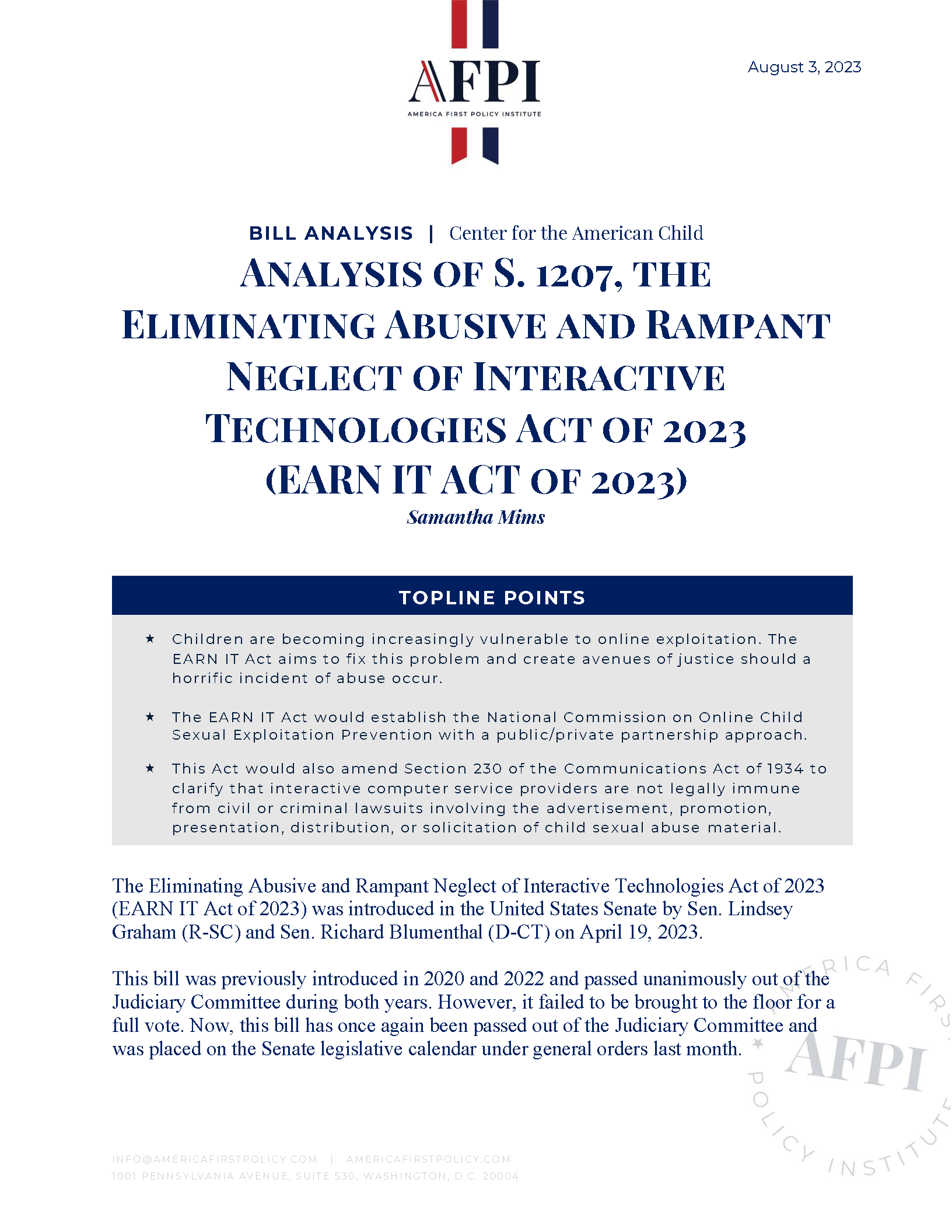BILL ANALYSIS: Analysis of S. 1207, the Eliminating Abusive and Rampant Neglect of Interactive Technologies Act of 2023 (EARN IT ACT of 2023)
Key Takeaways
Children are becoming increasingly vulnerable to online exploitation. The EARN IT Act aims to fix this problem and create avenues of justice should a horrific incident of abuse occur.
The EARN IT Act would establish the National Commission on Online Child Sexual Exploitation Prevention with a public/private partnership approach.
This Act would also amend Section 230 of the Communications Act of 1934 to clarify that interactive computer service providers are not legally immune from civil or criminal lawsuits involving the advertisement, promotion, presentation, distribution, or solicitation of child sexual abuse material.
The Eliminating Abusive and Rampant Neglect of Interactive Technologies Act of 2023 (EARN IT Act of 2023) was introduced in the United States Senate by Sen. Lindsey Graham (R-SC) and Sen. Richard Blumenthal (D-CT) on April 19, 2023.
This bill was previously introduced in 2020 and 2022 and passed unanimously out of the Judiciary Committee during both years. However, it failed to be brought to the floor for a full vote. Now, this bill has once again been passed out of the Judiciary Committee and was placed on the Senate legislative calendar under general orders last month.
If enacted, this legislation would:
Establish the National Commission on Online Child Sexual Exploitation Prevention.
Section 3 of the bill would establish the National Commission on Online Child Sexual Exploitation Prevention (“the Commission”) to develop and recommend best practices that can be implemented to prevent, reduce, and respond to the online sexual exploitation of children. The Commission would be made up of 19 members from across government agencies and appointees from the House and Senate.
This commission would be an effective first step in ensuring that dialogue between government, industry, advocacy, and victims continues. These conversations are crucial to understanding and providing solutions to the threats children face online.
Amend Section 230 of the Communications Act of 1934 to Protect Victims of Online Child Sexual Abuse.
Section 5 of the EARN IT Act would amend Section 230(e) of the Communications Act of 1934 by stating that Section 230(e) has no effect on child sexual exploitation law. This would mean interactive computer service providers can be civilly sued under Section 2255 of Title 18 of the US Code. Interactive computer service providers could also be sued civilly and/or criminally under state law for intentional, knowing, or reckless advertisement, promotion, presentation, distribution, or solicitation of child sexual abuse material.
Currently, the law does not provide victims or their families a legal avenue to seek justice when a platform fails to remove child sexual abuse material that is knowingly being circulated on their platform. Amending Section 230 would help rectify this problem.
Clarify That “Child Pornography” is Child Sexual Abuse Material.
Section 6 of the bill would clarify that the terms “child pornography” and “child sexual abuse material” hold the same legal meaning. Federal law on the books does not make this clear. This section would also retroactively amend several laws and the U.S. criminal code to cover “child sexual abuse material” instead of “child pornography.”
Modernize the CyberTipline to Increase Reporting.
Section 7 broadens the range of data that parties are required to submit to the National Center on Missing and Exploited Children (NCMEC) when reporting potential cases of child sexual abuse material (CSAM). The data specified includes location details, email addresses, and identifiable information concerning any “involved minor.” Section 7(a) expands the legal protections of websites when transmitting CSAM and associated information to the NCMEC. This update is needed because some entities have not been reporting instances of CSAM to NCMEC because they fear being prosecuted for transmitting such materials themselves.
Utilize IT Solutions to Combat Online Child Exploitation.
Section 9 directs the Office of Juvenile Justice and Delinquency Prevention to collaborate with the FBI, DHS, Homeland Security Investigations (HSI), ICE, Internet Crimes Against Child (ICAC) Task Forces, and U.S. Marshals to develop technological solutions and tools that deliver reliable and actionable information to law enforcement. Today, our government does not have the collaboration needed to successfully combat online child exploitation crimes with a whole of government approach. More collaboration would ensure that the full supply of government resources and experts are available and working together to solve these serious problems.
